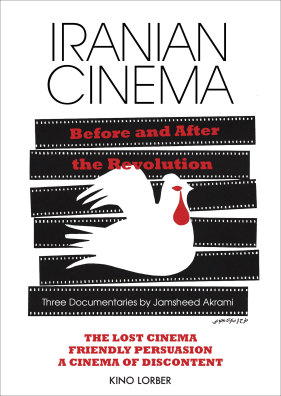Iranian Cinema Before and After the Revolution
Directed by Jamsheed Akrami
Dr. Jamsheed Akrami is a scholar of Iranian cinema. A former editor of Iranian film magazines, he has published extensively, presented numerous lectures, curated film series, and produced a number of films, including the feature-length documentaries The Lost Cinema, on political filmmaking under the Shah, and Friendly Persuasion, on Iranian cinema after the 1979 revolution. The films were screened in international film festivals and enjoyed theatrical runs and television screenings in US and Canada. A Cinema of Discontent completes Jamsheed Akrami’s trilogy on Iranian cinema.
Friendly Persuasion
USA, 2000, 99 min, In English and Persian with English Subtitles
“Friendly Persuasion” examines the critical issues of Iranian cinema by framing several key questions and providing informed responses through commentary, scene analysis, and interviews with top Iranian filmmakers. The questions focus on international flowering, censorship codes, role of the government, representation of women, and a world-class children's film movement.
The filmmakers interviewed represent a diverse group of Iranian auteurs including new-wave visionaries Abbas Kiarostami, Dariush Mehrjui, Bahram Bayzai, and Masoud Kimiaie as well as the post-revolutionaries Mohsen Makhmalbaf, Jafar Panahi, Rakhshan Bani Etemad, Majid Majidi, and Tahmineh Milani. The film scholar Richard Pena provides an insightful commentary.
A Cinema of Discontent
USA, 2013, 86 min, In English and Persian with English Subtitles
The international success of Iranian cinema over the past decades may have veiled the fact that Iranian filmmakers work under extremely harsh circumstances rarely seen in other national cinemas. Filmmaking in Iran is subject to tight government controls and strict censorship codes ranging from banning any criticism of the regime to highly restrictive codes on representation of women and their interactions with men. The imposed codes have undermined the creativity of the filmmakers and their ability to tackle pressing social issues.
“A Cinema of Discontent” explores the censorship codes through analyzing dozens of clips from mainstream and art-house films. It features insightful interviews with 12 Iranian filmmakers, including the internationally-acclaimed directors Jafar Panahi, Bahman Ghobadi, and the two-time Oscar winner Asghar Farhadi (A Separation, The Salesman)
The Film documents the brave efforts of the filmmakers whose defiance and attempts to subvert the codes have been punished by being banned from working, imprisonment, and forced exile.
The Lost Cinema: Iranian Political Films in the 70s
USA, 2007, 100 Min, English and Persian (with English subtitles)
The Lost Cinema is a film essay on the Iranian New Wave, a film movement which blossomed in the 70s as a protest against a local film industry dominated by shallow, socially uninformed domestic films and excessive exhibition of Hollywood and European imports. Despite the movement’s contribution to the political awareness of the Iranian middle class, the New-Wave films, along with all other pre-revolutionary titles, were banned due to their non-conformity to the severely restrictive censorship codes imposed by the Islamic government after the 1979 Revolution. The ban has effectively shelved half a century of film heritage in Iran.
U.S.-based film professor Jamsheed Akrami sheds light on a significant trend of politically themed films through analyzing selected films and interviews with Iranian filmmakers. Insightful comments are provided by scholars Andrew Sarris, William Beeman, Louis Forsdale, and John Downing.
Reviews More Reviews
“A splendid introduction to films from a country that has established one of the world’s finest national cinemas.”
“Entertaining and informative doc … enriching for those who follow Iranian cinema closely and an eye-opener for less worldly film buffs.”
“A Comprehensive portrait of a national art form…. A must-see for any serious fan of Iranian film…. “Friendly Persuasion” is more inspiring than depressing. For its message is an encouraging one: somehow art will find a way.”
“…. Two meticulous and insightful film essays that unpack some of the major issues of Iranian cinema- particularly the repressive censorship- through interviews with auteur filmmakers and choice extracts from their movies. (Akrami’s) The Lost Cinema: Iranian Political Films in the Seventies (2006), focuses on the Pahlavi period’s new-wave political cinema, while his Friendly Persuasion: Iranian Cinema after the 1979 Revolution (2000) centers on the emergence of art-house films in the Islamic Republic. These film essays are essential companions to any course on Iranian cinema.”
Press & Exhibitors
Below please find additional information and promotional materials for this film. Use the buttons on the left to request to book this film for theatrical or educational/community screenings.
For all press requests, please contact us at [email protected].

